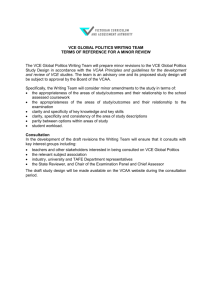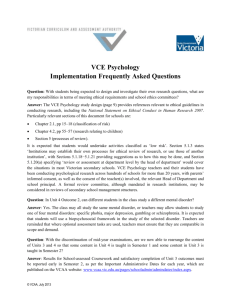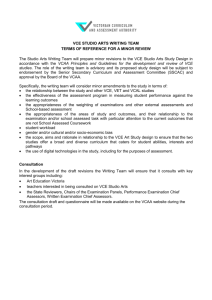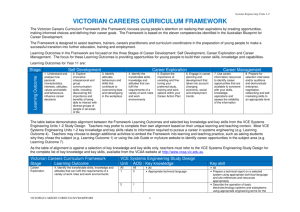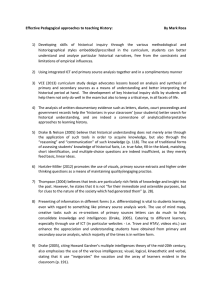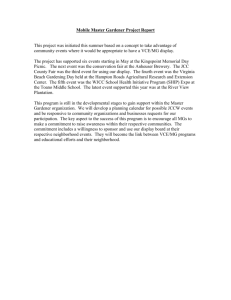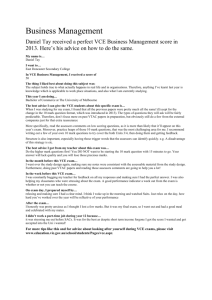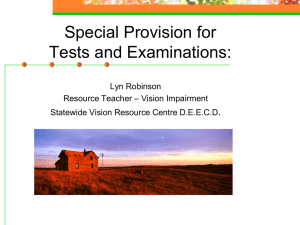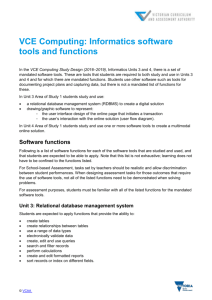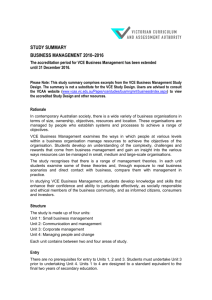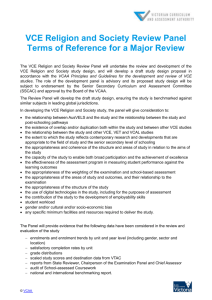VCAAConfVCEPhysics20..
advertisement
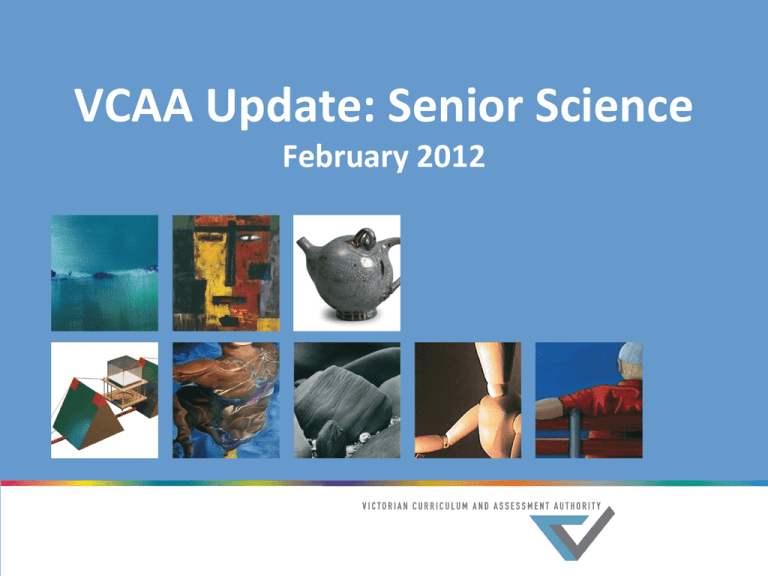
VCAA Update: Senior Science February 2012 Key messages • National curriculum - Years F-10 Science content and achievement standards approved by state/territory/federal education ministers - substantial implementation in Victoria from 2013 - an inquiry-based curriculum - public consultation draft national senior science subjects expected from ACARA in Term 2, 2012 - Victoria is the only Australian state/territory that holds mid-year examinations • VCE Sciences - current study designs accredited until 2014 - mid-year examinations will be discontinued from 2013 - mid-cycle amendments to study design will apply from 2013 2 Science participation rate - Australia Physics Participation Rate by State 25% 20% 15% 10% 5% 0% 1988 1990 1992 1994 1996 1998 2000 2002 2004 2006 2008 2010 Vic NSW QLD SA WA TAS NT ACT Years With thanks to the Australian Institute of Physics (Vic Branch) Education Committee http://www.vicphysics.org/edresearch.html 3 Science participation rate - Victoria Physics is the 11th most popular VCE study! With thanks to the Australian Institute of Physics (Vic Branch) Education Committee http://www.vicphysics.org/edresearch.html 4 Science enrolments - Victoria VCE Science enrolments 1995-2011 18,000 16,000 Number of students 14,000 12,000 Biology 10,000 Chemistry 8,000 Environmental Science Physics 6,000 Psychology 4,000 2,000 0 1995 1996 1997 1998 1999 2000 2001 2002 2003 2004 2005 2006 2007 2008 2009 2010 2011 Year 5 Popularity of VCE science studies in 2011 VCE study Popularity Biology Chemistry 6th 7th Environmental Science Physics Psychology numbers almost doubled in 2011 11th 3rd 6 Strands and sub-strands in the Australian Curriculum sub-strands strands Science understanding Science as a human endeavour Science inquiry skills •Biological sciences •Nature and development of science •Questioning and predicting •Chemical sciences •Earth and space sciences •Physical sciences •Planning and conducting •Use and influence of science •Processing and analysing data and information •Evaluating •Communicating 7 Inquiry-based science curriculum Years F-4: SIS strand •The Australian Curriculum: Science emphasises inquirybased teaching and learning Teacher-led inquiry Years 5/6: With guidance, select appropriate investigation methods to answer questions or solve problems… decide which variable should be changed and measured in fair tests Semistructured inquiry Studentdriven inquiry ??????? Years 11 and 12: •Opportunities for student-led open inquiry should be provided within each phase of schooling Years 7/8: Collaboratively and individually plan and conduct a range of investigation types…in fair tests, measure and control variables, and select equipment to collect data with accuracy appropriate to the task Years 9/10: Formulate questions or hypotheses that can be investigated scientifically… plan, select and use appropriate investigation methods… select and use appropriate equipment What are the implications for curriculum and assessment of an inquiry-based approach to science education? 8 Effective instructional strategies Strategies that improve student achievement: • • • • • • identifying similarities and differences (45%) summarising and note-taking (34%) using non-linguistic representations (27%) incorporating cooperative learning effectively (27%) setting objectives and providing feedback (23%) generating and testing hypotheses (23%) Robert Marzano, Debra Pickering and Jane Pollock, 2001 Refer also: - James Stigler and James Hiebert: the Teaching Gap (1998) - Anne Tweed: Designing Effective Science Instruction (2007) - John Hattie: Visible learning (2009) 9 Bloom’s revised taxonomy Cognitive skill Activities Products Remembering memorise; know vocabulary; match; listen facts; date/location/person; record Understanding sort; compare; question; observe; research; list diagram; model; procedure; article Applying construct; demonstrate; manipulate; plan; report; experiment; construct; interview; simulate; draw; interview journal/blog; diagram; map; model; collection; puzzle; illustration Analysing categorise; classify; organise; survey; integrate; separate; simplify; contrast questionnaire; graph; spreadsheet; data; report Evaluating recommend; conclude; judge; debate; discuss; reflect; critique; survey; test; investigate; propose; edit; choose recommendation; self evaluation; survey; conclusion; group discussion; news item Creating combine; hypothesise; estimate; infer; predict; invent; imagine; design; make podcast; invention; structure; product; news article; machine Reflection: Which of these cognitive skills can be effectively assessed through exams? SACs? 10 VCAA consultation feedback: general science • Too much content for a single examination • Weighting exam:SACs of 66:34 overemphasises contribution of examination (‘bad day’ = ‘bad score’) • Weighting exam:SACs of 66:34 is not equitable with other VCE studies • Students will no longer receive mid-year feedback so that they can make changes to improve their performance • Study designs require further minor ‘tweaking’ re clarity and scope 11 VCE consultation feedback: Physics Stakeholder feedback: • More information needed about examination format • Consider assessing only one Detailed Study in the exam, or no Detailed Studies in the exam (only by coursework) • Allow choice of two from the six available Detailed Studies • Trial examination paper should be prepared sooner rather than later 12 Further consultation The VCAA is eager to receive further feedback about specific proposals developed to address issues identified through the February online consultation process: Issue Considerations Exam length = 2½ hours • • • Two student exam sheets No change to current situation Weighting of exam:SAC = 60:40 • • Less reliance on assessment for a single examination Minimal change for teacher workload Choice from 6 Detailed studies (as per Units 1&2) • Greater flexibility for teachers to develop programs and for students to revise work Teachers will still be required to complete one DS in Unit 3, and one DS for Unit 4, to meet reporting and S/N requirements Exam structure – students address only one of the two Detailed Studies • • • Move towards increased alignment with other VCE studies Feasible to examine content 3 hours may be arduous/inequitable, especially for students undertaking multiple science studies Both Detailed Studies are assessed through School-assessed coursework Choice provided for students as per other studies (e.g. English – students study multiple novels, but choose one in exam) 13 Contact Maria James Curriculum Manager, Science VCAA Telephone: 9651 4655 Email: james.maria.m@edumail.vic.gov.au 14

